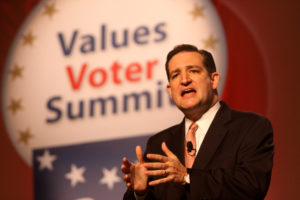Once upon a time, a politician with a quick wit conveyed confidence, intelligence and a sense of humor. Americans loved politicians who could think quickly on their feet under pressure. Now, we get packaged, pre-written statements read from a teleprompter.
With all the humor sucked out of the political arena in our culture, we now endure weaponized quips, tweets and slogans. Instead of offering us a relief from the tension of partisan battles, now the quips and company feel like bombs dropping on our heads.
Quips now come with hidden agendas. Hiding behind the quips, the pretensions, the denials: the ugliness of racism, sexism and more.
Politicians have mastered the negative rhetorical trope of paralipsis. “I’m not saying, I’m just saying.” They are slicker than a blue channel catfish when confronted with quips they made that others experience as cruelty. When cruelty replaces humor, we are a people in trouble.
Judith Shklar argued that cruelty is ugly and that it disfigures, literally and metaphorically, the human character.
“Cruelty is ugly and it disfigures, literally and metaphorically, the human character.”
Marina Levina argues, however, that her childhood tormentors received joy from their cruelty. “I know,” she says, “that being cruel brought them joy — the glint in the eyes, the straightening of the posture, the smirk — the joy of the oppressor is what makes cruelty so effective as a tool of the oppression. Therefore, I argue that in order to understand cruelty, we need to consider that an exercise of power can often be joyful.”
This is the danger of the weaponized quips, tweets and sound bites that dominate our political landscape.
‘Quips live in the gutter’
Politicians no longer offer quips to be funny but to do damage, inflict harm, humiliate others. The real purpose of the quip is to have it replayed on Twitter, Instagram or the news channels.
Now quips live in the gutter. Politicians throw out quips like a short-order cook pitching out garbage from the back of a Waffle House. For generations, democracies have relied on social capital (extensive social networks with high levels of trust), strong anchor institutions, and shared stories. Jonathan Haidt says, “Social media has weakened all three.”
Quips are now poisoned arrows dipped in the vitriol of a brew of anger, resentment and disdain. There’s no humor, just a mean-spirited determination to inflict damage to opponents. Even a casual study of the quips, tweets and slogans reveal words reeking of ugliness: “crazy,” “sick,” “stupid,” “loser,” “socialist,” “communist.”
Brian Ott and Greg Dickinson chart the rhetorical style that defines quips, tweets and slogans in The Twitter Presidency. They argue that this rhetorical style “reflects an aesthetics of white rage, and it is rooted in authoritarianism, narcissism and demagoguery.”
“The medium is the message” is a phrase coined by the Canadian communication theorist Marshall McLuhan in 1964. Now the medium serves as the conduit for the affective dimensions of outrage. Ott and Dickinson argue that this is made possible because the medium’s (Twitter) defining characteristics are simplicity, impulsivity and incivility. The merger of message and digital medium has created a part-human, part-machine super villain threatening democracy — its practices, norms and institutions.
Liberalism backfiring
Quips, tweets and slogans make up a rhetorical style. This is not a matter of one person speaking, but a conglomeration of speakers along with cultural, political and technological factors. We are witnessing an unexpected consequence of the liberal notions of individualism concerning truth and ethics.
The quipsters are taking advantage of a liberal philosophy of indifference to what others see as the good. The logical consequences of this philosophy put us squarely into the realm of dangerous liberal slogans: “Everyone is entitled to his opinion,” “Everyone has his or her own truth,” “We are all sinners, so who can judge?”
What once would have been considered a manifold act of wickedness is now sloughed off with, “He didn’t kill anyone.” We have an individualized consumerism of the mind whose logical consequences are showing up everywhere in the subjective rhetoric of “post-truth.” Conservatives are using liberal philosophy as a weapon to justify their cruel and hurtful rhetoric.

Ted Cruz
For example, U.S. Sen. Ted Cruz speculated that a liberal law clerk leaked the Supreme Court’s majority draft opinion that is likely to overturn Roe v. Wade: “I think it is very likely a law clerk. And it is very very likely a law clerk for one of the three liberal justices. If I were to guess, the most likely justice for whom the law clerk is clerking is Sonia Sotomayor because she’s the most partisan of the justices.”
Cruz admitted that he based his guess on his opinion that Sotomayor is the justice most likely to hire “wild-eyed partisans as clerks.”
Cruz, in ignorance or arrogance, claims he is only making an inference. A quick heads-up: An inference is a conclusion reached on the basis of evidence and reasoning. Cruz claims to be making an inference but without evidence or reasoning. He knows that evidence and reasoning are unnecessary distractions in the media world of tweets and soundbites. The possibility that the leak came from Justice Sotomayor’s staff now joins the detritus of all other social media and will be picked up and repackaged as truth in various media fronts. Here, outrage is the point.
“An inference is a conclusion reached on the basis of evidence and reasoning. Cruz claims to be making an inference but without evidence or reasoning.”
Sen. Cruz is no stranger to the outrage circus. In defending Gov. Ron DeSantis’ attack on Disney, Cruz said: “I think there are people who are misguided, trying to drive, you know, Disney stepping in, saying, you know, in every episode now they’re gonna have, you know, Mickey and Pluto going at it. Like, really?”
Franklin Graham and John Kennedy
Franklin Graham, a longtime creator of outrage, joined the Cruz circus: “LGBTQ activists are using corporations to force their agenda on the public, and companies may want to take another look at what they are allowing to happen. Disney has gone too far. The people of Florida have revolted, and it’s going to cost Disney big time. Disney had a special tax status in the state which they benefitted from in a huge way — but because they came out against the parents of Florida, the governor and legislators have revoked that status.”
The idea that LGBTQ activists are forcing their agenda on the public sounds strange considering how many centuries a straight, heteronormative, sexist culture forced its punitive agenda on LGBTQ persons in demeaning, hurtful and vicious ways.
As if he’s competing for the Quip Master of American politics, Sen. John Kennedy of Louisiana spends an inordinate amount of time composing quips:
- “I think they’re making a big mistake if they start tacking on extraneous issues to the budget. We have enough trouble doing a budget by itself. We haven’t had one since Moses walked the earth. It’s embarrassing.”
- “Facebook is a great company, but it’s no longer a company; it’s a country. That’s how powerful it is. And its behavior lately has kind of been getting into the foothills of creepy.”
- “I am petrified of giving the power to confiscate guns and ask questions later to public officials. … If you trust government, you obviously failed history class. The Native Americans gave up their guns, too.”
Kennedy is chiefly now known for his quips and soundbites. He claimed that giving Equifax an IRS contract would be like “giving Lindsay Lohan the keys to the minibar.” He told a judicial nominee “just because you’ve seen My Cousin Vinny doesn’t qualify you to be a federal judge.” Speaking of former Trump lawyer Michael Cohen, Kennedy cracked, “Jesus loves him, but everyone else thinks he’s an idiot.”
Ironically, Kennedy is one of the best-educated members of the Senate. He graduated magna cum laude from Vanderbilt University and edited the Virginia Law Review. He graduated with first-class honors from Oxford. Yet HuffPost labeled him as “the folksiest man in the Senate.”
“I put a nickel in John Kennedy and a quote came out.”
My assumption that quipsters attract the media gets the full “amen” with Kennedy. “I needed a quote for my story,” a Capitol Hill reporter remarked to colleagues in the Senate basement. “And what do you know? I put a nickel in John Kennedy and a quote came out.”
 “This is Washington, D.C. Politics is in everybody’s blood, kind of like herpes,” Kennedy said. He described the Senate as “running around like a bunch of free-range chickens.” When a budget staredown threatened to shut down the government, he lamented that “our country was founded by geniuses, but it’s being run by idiots.” He has a habit of repeating his favorite one-liners. He said he’d “rather drink weed killer” than support automatic tax increases, support Obamacare, or join the Washington insiders club. No one has captured the power of ratcheting up of the quip like Sen. Kennedy.
“This is Washington, D.C. Politics is in everybody’s blood, kind of like herpes,” Kennedy said. He described the Senate as “running around like a bunch of free-range chickens.” When a budget staredown threatened to shut down the government, he lamented that “our country was founded by geniuses, but it’s being run by idiots.” He has a habit of repeating his favorite one-liners. He said he’d “rather drink weed killer” than support automatic tax increases, support Obamacare, or join the Washington insiders club. No one has captured the power of ratcheting up of the quip like Sen. Kennedy.
Comparing the current batch of quipsters to the masters of the quip that preceded them shows how far the bar has been lowered. The shining lights of political quipsters are too numerous to enumerate, but some stick out as Quip Masters. A sampling of the masters practicing their craft should be sufficient to show how the quip has changed from good humor to weaponized rhetoric.
Abraham Lincoln: “If I were two-faced, would I be wearing this one?” or “He can compress the most words into the smallest ideas better than any man I ever met.”
John F. Kennedy: “I just received the following wire from my generous Daddy: ‘Dear Jack, don’t buy a single vote more than is necessary. I’ll be damned if I’m going to pay for a landslide.'” Or, “I think this is the most extraordinary collection of talent, of human knowledge, that has ever been gathered together at the White House, with the possible exception of when Thomas Jefferson dined alone.”
Lyndon Johnson: “If one morning I walked on top of the water across the Potomac River, the headline that afternoon would read: ‘President Can’t Swim.'” Or, “Being president is like being a jackass in a hailstorm. There’s nothing to do but to stand there and take it.”
Ronald Reagan: “Politics is supposed to be the second-oldest profession. I have come to realize that it bears a very close resemblance to the first.” Or, “I hope you’re all Republicans,” quipped to surgeons as he entered the operating room following a 1981 assassination attempt.
Bill Clinton: “Being president is like running a cemetery: you’ve got a lot of people under you and nobody’s listening.” Or, “If you want to live like a Republican, vote like a Democrat.”
But then in prophetic words, Clinton argued, “The media knows what sells — conflict and division. It’s also quick and easy. All too often anger works better than answers; resentment better than reason; emotion trumps evidence. A sanctimonious, sneering one-liner, no matter how bogus, is seen as straight talk, while a calm, well-argued response is seen as canned and phony.”
Playing on fear and outrage
The differences between the pre-social media age and the saturated one we now endure are exaggerated by fear and anxiety over the presumed loss of privilege by white males. Today’s quipsters play on fear and outrage to draw attention. This is aided by the power of all the social media platforms and enhanced by the deleterious state of much of the news media (Fox News and Tucker Carlson most obviously).
My conclusion is that we should not fall for the humbuggery of a vicious, fear-based, truth-challenged social media. Democracy deserves more than sound bites, quips, tweets and slogans from our elected officials. How many times a politician makes the news with a quip never should be as important as how many times she or he votes for an improvement of the quality of life for all Americans.
The quipsters are the most dangerous people in our nation. They reduce democracy to B-grade entertainment, drag good people through the mud and beckon the worst angels of the American spirit — a racism that increases even as it is denied and a callousness and crassness that divides us even more. We need fewer quips and better government.

Rodney Kennedy
Rodney W. Kennedy currently serves as interim pastor of Emmanuel Freiden Federated Church in Schenectady, N.Y., and as preaching instructor Palmer Theological Seminary. He is the author of nine books, including the newly released The Immaculate Mistake, about how evangelical Christians gave birth to Donald Trump.
Related articles:
Assessing the damage Twitter has done to Christianity | Opinion by Mark Wingfield
What will Twitter’s $44 billion purchase do to theological discourse? | Analysis by Rick Pidcock
Meet the TheoBros, who want you to know they’re right about everything | Analysis by Rick Pidcock


